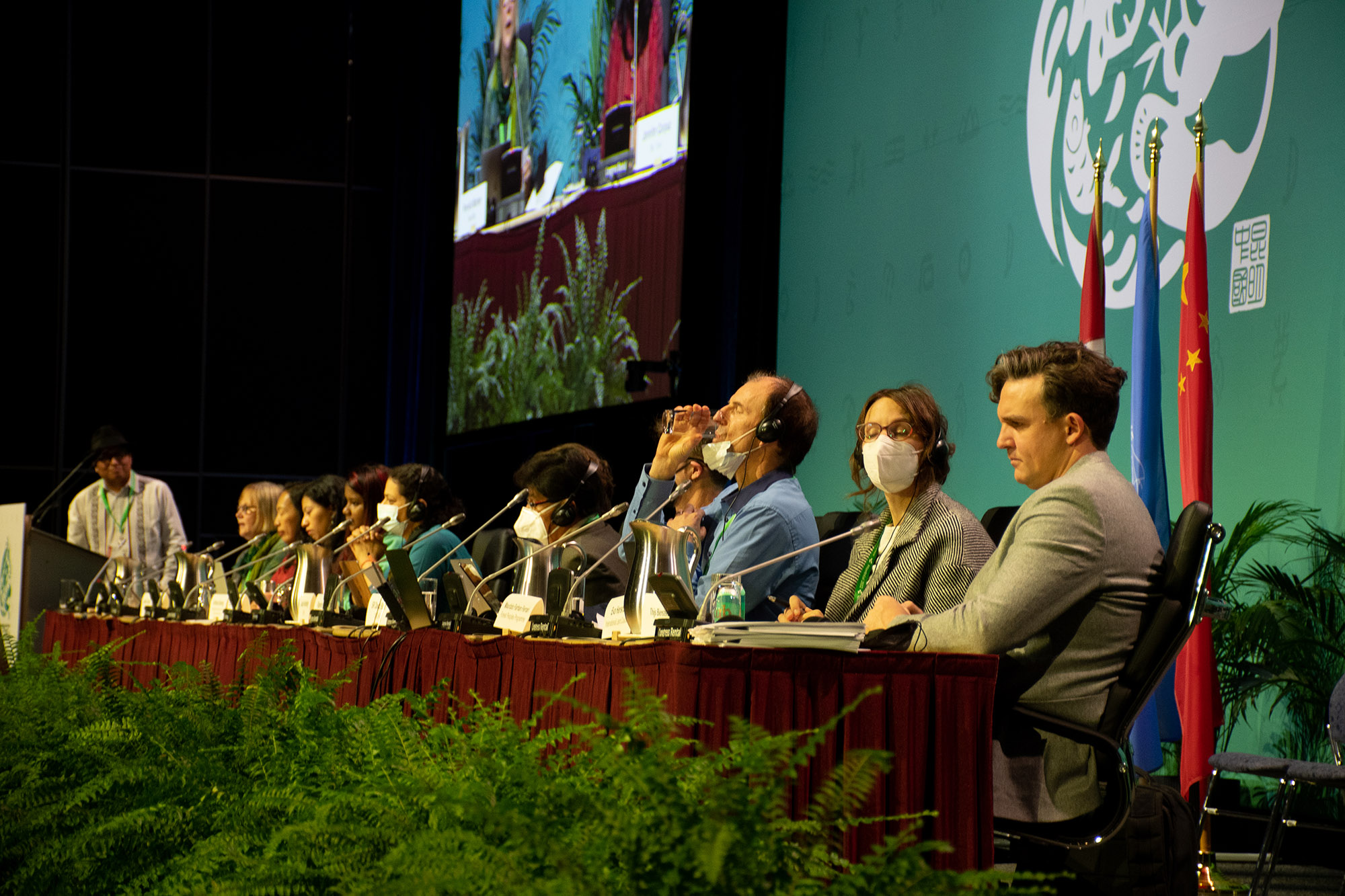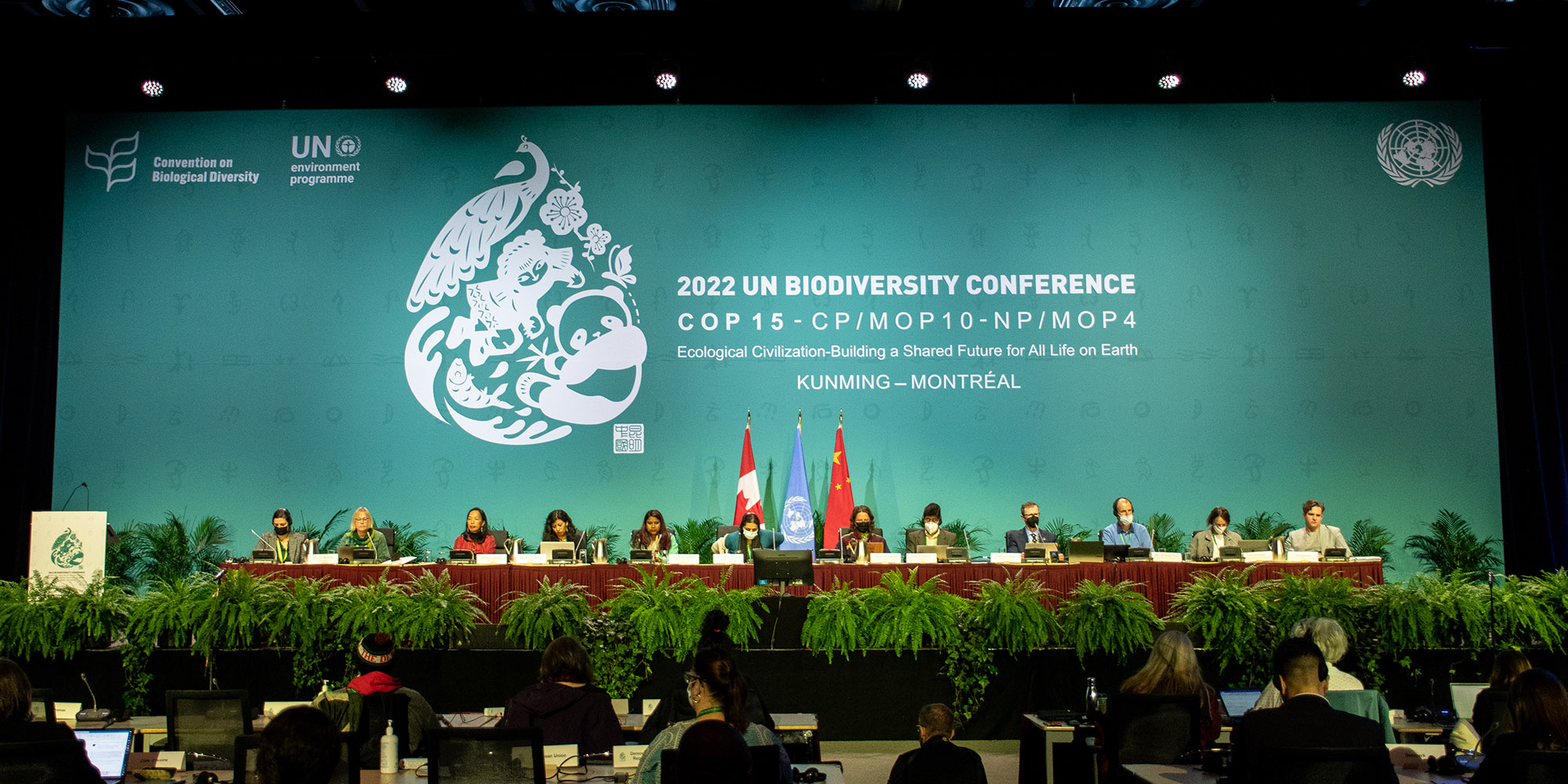Despite being the most important gathering of global diplomats to slow the devastating loss of plant and animal species, the United Nations’ semi-annual biodiversity conference (COP15) is drawing far less attention, and collective political power, than its popular sister, the UN climate change conference (COP27), did in Sharm el-Sheikh, Egypt last month.
Here in Montreal, there’s about a quarter of the attendees and journalists compared with Sharm el-Sheikh, although the two themes – biodiversity and climate change – are inextricably linked.
“The problem is the policy community has separated [climate and biodiversity issues] in a climate convention and biodiversity convention, and those two conventions don’t speak with each other,” Paul Leadley, professor at the University of Paris Saclay, told Daily Maverick in one of the many negotiating rooms in Palais des Congrès, where the 15th “conference of the parties” to the Convention on Biological Diversity is being held from 7 to 19 December.
Read more in Daily Maverick: “Another COP? Here’s what you need to know and why you should care”
“And for some reason, governments don’t want them to speak to each other very much.”
Leadley, an expert on both climate change and ecology, was speaking about how climate change and biodiversity loss are looked at separately on a policy level when the scientific community has been highlighting for years that they are interlinked issues.
 Delegates to COP15 held in Montreal on 12 December 2022. (Photo: Julia Evans)
Delegates to COP15 held in Montreal on 12 December 2022. (Photo: Julia Evans)
“It’s more of a political problem than a scientific problem. We know what the issues are,” said Leadley.
For example, a 2021 report by both the Intergovernmental Science-Policy Platform on Biodiversity and Ecosystem Services (IPBES) and the Intergovernmental Panel on Climate Change (IPCC) illustrates:
“Increased atmospheric greenhouse gas concentrations lead to increased mean temperatures, altered precipitation regimes, increased frequency of extreme weather events, and oxygen depletion and acidification of aquatic environments, most of which adversely affect biodiversity.
“Reciprocally, changes in biodiversity affect the climate system, especially through their impacts on the nitrogen, carbon and water cycles.”
In other words, depleted ecosystems can contribute to climate change, and climate change contributes to depleting ecosystems and undermining biodiversity.
Shonisani Munzhedzi, CEO of the South African National Biodiversity Institute (SANBI), a national entity that researches, monitors and reports on biodiversity in South Africa, explained to Daily Maverick an example of ecosystem-based adaptation, which is how biodiversity can be used to enhance our resilience to anthropogenic climate change.
“If you keep your ecosystems intact, whether there are climate extremes… the ecosystems will be able to cushion us from the impact of climate change,” said Munzhedzi, who is also co-chairing the contact group on resource mobilisation for COP15.
An example, Munzhedzi said, is how functional wetlands and functional strategic water sources can absorb extreme rainfall, an impact of climate change that will only increase in frequency and intensity in a high-carbon future.
“If it rains hard for 20 days, the water gets to be mitigated – absorbed into the wetland system, the wetland system will deal with it.”
Leadley is representing Future Earth at this COP15, an intergovernmental organisation on sustainability science, that has prepared science briefs on target 8 of the Global Biodiversity Framework (GBF), which looks to minimise the impact of climate change on biodiversity.
Scientists like Leadley advised negotiators that it’s feasible to have about five to 10 gigatonnes of CO2 equivalent per year of climate mitigation from nature-based solutions.
Read more in Daily Maverick: “The sad truth is, most humans don’t give a damn about nature”
Nature-based solutions are contentious, and it’s a buzzword flying around this conference. It has many long, complex and evolving definitions, but inherently means using natural features and processes to address issues like climate change or biodiversity loss. An example would be mitigating climate change by preventing degradation and deforestation, since forests act as carbon sinks.
To put that in context, Leadley said current fossil fuel emissions are about 35 gigatonnes of CO2 emissions.
Khungeka Njobe from WWF SA acknowledged that this conference and the main text being negotiated, the Global Biodiversity Framework, hasn’t had as much senior political support as the climate conference (COP27) had.
This is detrimental to both conferences, to both issues, as “climate and biodiversity are two sides of the same coin… you cannot give one attention and think that you are going to be successful on the other.”
“I feel like mainstream society needs to engage with [biodiversity] equally,” continued Njobe, “because basically climate relies on the integrity of biodiversity. In other words, you need biodiversity for us to be able to buffer against the impacts of climate.”
So, why doesn’t this synergy exist?
“In a climate convention, you have much different power relationships than you do in a biodiversity convention,” said Leadley. “And they don’t want to mix up the power relationships that you have in the two different conventions.”
Leadley explained that at climate conferences, those with the greatest vested interest in producing fossil fuels and the ones with largest greenhouse gas emissions will have more interest because they have more to lose.
“So, the biggest emitters of greenhouse gases are the United States, China, India and so forth. And the big power players in terms of production are the Middle East, among others,” said Leadley.
“When you come here [biodiversity conference], the power structure is very different. Most of the biodiversity is in developing countries.”
About 80% of the world’s 17 mega-biodiverse countries are in developing nations, including South Africa.
“So, the power structure – who speaks with the most authority and in terms of capacity to act on biodiversity – is very, very different than in the climate convention,” explained Leadley.
 At COP15 there’s about a quarter of the attendees and journalists compared with Sharm el-Sheikh. (Photo: Julia Evans)
At COP15 there’s about a quarter of the attendees and journalists compared with Sharm el-Sheikh. (Photo: Julia Evans)
So, there are different power structures and vested interests from powerful countries at COP15.
But the division in policymakers also comes with the scepticism around climate change co-opting nature-based solutions.
At COP15, Leadley said negotiators and delegates here are very much aware of the climate-biodiversity links, acknowledging it more so than at the climate COP27 in Egypt, but they are worried solutions will be too focused on the climate and not nature-based.
South African climate scientist Chris Trisos and biodiversity scientist Guy Midgley previously pointed out to Daily Maverick that some nature-based solutions for climate change, such as afforestation, could negatively affect biodiversity, like planting alien invasive trees in naturally unforested ecosystems such as African savannas and grasslands.
Visit Daily Maverick's home page for more news, analysis and investigations
“That’s why it’s so important that there’s much stronger contact between the biodiversity and climate communities, because planting trees in savannas is a bad idea from just about every possible perspective,” said Leadley.
Unlike at the climate conference in Egypt, Minister of Forestry, Fisheries and the Environment Barbara Creecy will not be attending this conference, ostensibly due to the ANC’s national conference taking place at the same time.
The director-general of the Department of Forestries, Fisheries and the Environment (DFFE), Nomfundo Tshabalala, and deputy director-general for biodiversity and conservation of the DFFE Mohlago Mokgohloa, are leading the South African delegation to this conference.
It has also been a point of contention that no heads of state are attending COP15.
Architects of the“Paris Agreement” (a landmark treaty signed at the climate change conference in 2015) called on world leaders to attend this biodiversity conference, emphasising the interconnected nature of biodiversity and climate.
“There is no pathway to limiting global warming to 1.5°C without action on protecting and restoring nature,” stated the signatories in the weeks leading up to COP15.
Merging the climate and biodiversity agendas is nevertheless one of the major themes in Montreal.
At a press conference on Monday, 12 December, executive secretary of the Convention on Biological Diversity, Elizabeth Mrema, responded to this issue: “I think it’s very clear now that we have all understood the connection between climate change and the loss of biodiversity.”
Mrema mentioned that since the climate conference in Glasgow last year (COP26,) where biodiversity was on the agenda for the first time, and again this year in Sharm el-Sheikh, where a whole day was dedicated to biodiversity, the link has been clear.
“And here it is the same,” she said. “I don’t think many people are making that clear distinction, it’s more and more reminding each other of the connection between biodiversity loss and climate change.” DM/OBP
This story was produced as part of the 2022 CBD COP15 Fellowship organised by Internews’s Earth Journalism Network.




 Parties of the United Nations at the Nature and Culture Summit during COP15 held in Montreal, Canada, and hosted by the Chinese government, 12 December 2022. (Photo: Julia Evans)
Parties of the United Nations at the Nature and Culture Summit during COP15 held in Montreal, Canada, and hosted by the Chinese government, 12 December 2022. (Photo: Julia Evans) 